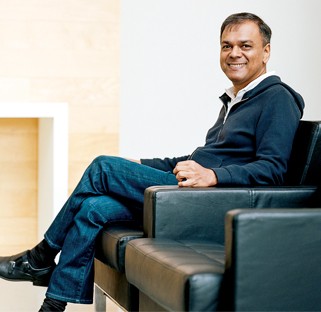An Outsider Executive Pushes Change at JLL
Dramatic change can sometimes only be achieved with an outsider’s help. Commercial real estate giant Jones Lang LaSalle (JLL), a 250-year-old firm that manages properties for Fortune 500 companies around the world, wants to emerge as its sector’s digital leader. In 2017, JLL announced a $100 million investment in a technology-focused business unit called JLL Spark. The goal, as CEO Christian Ulbrich averred, was to “accelerate JLL’s drive to be the clear global leader in digital real estate services.”
Then last July, it brought a fresh set of eyes into its C-suite to build further momentum. The company tapped Vinay Goel, who spent 11 years at Google as a product leader overseeing the development of marquee products including Google Maps, as its chief digital product officer.
Anyone who knows JLL’s familiar profile—rather than its current transformation plans—might be perplexed at Mr. Goel’s industry switch. But he decided to pivot his career because his mandate at JLL is nothing less than pivoting the $7.9 billion business through digital transformation. “Today, we are a real estate company that implements software,” Mr. Goel says. “Down the line, we will be much more of a technology company that does real estate.”
Mr. Goel admits he knows little about the real estate industry. But as he gets to know the new terrain, he is sharing insights about how leading tech companies conduct business. And not only Google; Mr. Goel previously worked at Oracle, Intel and several startups.
How can an industry outsider help shift an organization’s mindset? And what are the challenges to steering a highly successful company in a new direction? IQ spoke with Mr. Goel, who works in Menlo Park not far from his old office at Google headquarters, to find out.
“Companies [have] created tens of billions of dollars of value by not just putting an app in the marketplace, but essentially connecting the digital with the physical.”
—Vinay Goel, chief digital product officer, JLL
IQ: Why did you decide to change industries?
Vinay Goel: In the ’90s, most people got their first laptop or fast internet connection at work. Now, things have flipped. I can go buy an Amazon Echo or a Google Home device that allows me to order my Uber or make a restaurant reservation or control the temperature in my house. But when I come to work, I can’t control my surroundings at the same level.
I’m excited about making that innovation happen in the enterprise—there’s a big opportunity.
The other thing is, if you look at where most of the value has been created over the last 10 years—look at Uber, Airbnb, WeWork—all of these companies created tens of billions of dollars of value by not just putting an app in the marketplace, but essentially connecting the digital with the physical. Each one of these companies have people and physical assets that get exhibited through a digital innovation.
But how do you take the home automation phenomenon and move it into the enterprise? You’re going to need someone to change the wiring and do the right integrations with physical buildings. Who better to do it than people who are meeting the service providers in the commercial real estate space?
IQ: What’s your vision for how JLL will bring the digital and physical together?
VG: In the process of helping clients manage their facilities, we found there is a lot of automation that can happen. There are a lot of technologies we could bring to the fore to make the cost of running facilities much more efficient. For example, we can put in sensor-based lighting systems that automatically shut off when people aren’t present, or use internet of things sensors to understand occupation patterns.
Today we are in the former stage where we are offering a lot of bespoke services to customers. The challenge for not only JLL but for the whole industry is productizing these services. How do you make them a product that not just a facility manager interacts with but that every employee feels empowered to use?
IQ: How does your background at Google distinguish the mindset you bring to JLL?
 VG: First, I bring more of a user-focused and product-oriented mindset into the digital transformation. I always start with what we are doing for the user. How are we dramatically changing the life and experience for a user? If we start with the user first, it really helps you define a solution as opposed to starting with a specific function.
VG: First, I bring more of a user-focused and product-oriented mindset into the digital transformation. I always start with what we are doing for the user. How are we dramatically changing the life and experience for a user? If we start with the user first, it really helps you define a solution as opposed to starting with a specific function.
In many cases, the user is really the 50,000 employees who sit in a company as opposed to the, say, five facility managers whom we interact with. We need to broaden the net in terms of who your users are, so we get broader inputs as you build and design your products.
Second is my interest in thinking around scale. A lot of times, one client says, “I really need this functionality.” We figure out a way to build that functionality and offer it to the client, but the better way to do this is to build platforms. You build platforms and ecosystems that then every client can benefit from. As you bring a product mindset, you start thinking in terms of scalability and platform as opposed to one-off solutions.
Beyond those two points, it’s about thinking about how to leverage the latest technology. Technology is moving very, very quickly. But sometimes it takes five years before something makes its way into our core products. How do you accelerate that? Because the faster you can put those types of technologies into core products and offerings, the faster our customers will see cost savings, efficiencies and better user experiences.
IQ: What did you feel you could bring to the table by moving to a new industry?
VG: Some of the really interesting, challenging problems that I’ve solved, especially while at Google, have a lot of parallels to JLL. I spent almost six years running different parts of Google Maps. Just like JLL needs to know information about every commercial property in the world, Google had to get information about every local business, whether it’s a plumber or a shopping mall or a restaurant. There are a ton of attributes that you need about businesses or physical entities to make a compelling service.
Similarly, JLL has to do this for commercial real estate: What are the parking structures? What’s the square footage? How many desks can a space hold? The attributes change, but the methodologies of what’s required and the scale of data required do not change. But it’s not just product design; I’m bringing knowledge of how to take products to market and monetize them—and how to build products that can scale.
IQ: What challenges have you experienced with your transition?
VG: I invest a lot of my time in launching a sort-of startup within JLL. Hiring the right engineering people, hiring the right product managers who know how to build software products and building a startup mentality. We want to build a Silicon Valley presence, scale globally and build out the same kind of products that you would expect from traditional software companies. My immediate challenge is to ensure I can actually build a team that can execute innovation.
That’s a contrast with my time at Google. The assets that sit within JLL, the networks that we have with service providers, the relationships that we have with customers, would be very hard for large software companies to ever replicate. And they are a prerequisite to play in this market. At JLL, I’ve got the go-to-market assets and networks, but I need to build the talent. Whereas at Google, we didn’t have the former, but we had the talent.
IQ: How are you driving new thinking at JLL?
VG: Typically we’ve been a very people-oriented business. We scale by deploying more people. The software business is exactly the opposite: You scale by reducing the number of people. You might deploy more people just to get a product off the ground, but as you scale you automate more and remove people from the equation. As we think about product mentality, I think that’s the new way of thinking as well.
IQ: Is that difficult for people to accept?
VG: Not really. At the end of the day, this is a business, and if you bring efficiencies and exciting new products to market, it’s very hard to say no to that. People here have been super excited about the direction. I think this is a journey that most people have wanted to go on for some time.
“My immediate challenge is to ensure I can actually build a team that can execute innovation.”
—Vinay Goel, chief digital product officer, JLL
IQ: What are some of the major roadblocks you anticipate encountering?
VG: When you’re in the product formulation and construction phases, it’s a lot easier. You can hire the teams and build out the product. Thinking through the go-to-market strategy is trickier. Luckily we have people on the ground. We’ll have to see how customers accept us as a software company and how we end up monetizing. We have to determine what kind of business models we can create and how customers react to business models from JLL that may be quite orthogonal to what they’ve seen before. Those are all question marks.
IQ: How are you building trust with your colleagues to help drive change?
VG: This will be an ongoing process. A lot of times we discuss strategic and tactical things, but we also end up spending a lot of time talking about culture: what is effective in the existing JLL culture, how other teams and companies have done things, what product management means and what are best practices for building software products.
A lot of the ideas that I’m spending time on are not necessarily ideas that I’ve come up with. Lots of people within JLL have been ideating. My job is more like a consultant coming in and putting the right wrapper around an idea so that it can go to market. Share on X When you go through that process with colleagues and everyone circles around a strategy, you build trust.



